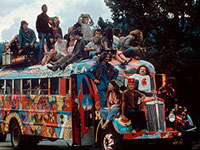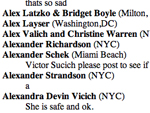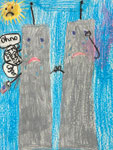The September 11, 2001, Documentary Project represents the "shortly after" reaction of U.S. citizens and others regarding the World Trade Center, Flight 93, and Pentagon attacks of the 11th of September 2001, as gathered by ethnographers at the request of the American Folklife Center. The collection of responses started the 12th of September and continued for several months.
Here, you can listen to and/or watch nearly 200 audio and visual oral histories, access 21 written narratives—such as that of one woman who missed her train the morning of the attack and, as a result, was not in the WTC as she normally would have been—and view 45 photographs and drawings, many of the latter of which display children's perspectives. The videos are all from Naples, Italy, providing a look at 9/11 from outside of the country.
Sources can be browsed by type, title, or subject, as well as keyword searched.
Classroom Connection offers a list of Library of Congress and external related resources, as well as a grade level, state, and subject search which can show you how the collection relates to your particular curriculum standards.


